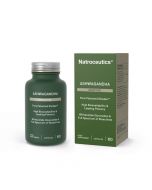
Does Ashwagandha Affect Birth Control? Hormones & Fertility
Key Points
- Ashwagandha and Birth Control: No studies show a direct negative impact on birth control efficacy, though it may affect testosterone and thyroid hormones.
- Testosterone Impact: Ashwagandha may increase testosterone, potentially influencing ovulation and hormonal balance, especially in conditions like PCOS.
- Thyroid Health: Ashwagandha can affect thyroid hormones, which might impact birth control effectiveness.
- Fertility: Ashwagandha may improve male fertility but has inconclusive effects on female fertility.
- Safety: Ashwagandha is generally safe with birth control but should not be used during pregnancy.
- Dosage: Typical dosages range from 300mg to 600mg per day.
What is Ashwagandha?
Ashwagandha, also known as Withania somnifera, is a popular herbal adaptogenic supplement that has been used for thousands of years in traditional Ayurvedic medicine. Many people turn to ashwagandha for its potential benefits, including stress reduction, better sleep, and improved athletic performance. Overall, studies have found that ashwagandha significantly reduces stress and anxiety levels, decreases sleeplessness and fatigue, and lowers serum cortisol levels (a stress hormone) compared to placebo.
While studies highlight the health benefits of ashwagandha, its direct impact on hormonal birth control remains somewhat unclear. Here's what you need to know, based on current research.
Does Ashwagandha Interfere with Birth Control?
There are no conclusive studies to show that ashwagandha has a direct negative interaction with birth control pills. However, ashwagandha has been shown to affect testosterone and thyroid hormones, both of which play a role in how birth control works.
Ashwagandha & Testosterone
Ashwagandha has been found to increase testosterone levels, which could potentially influence ovulation and hormone regulation. Studies found that ashwagandha supplementation raises testosterone levels in women and men. This is particularly relevant in conditions like Polycystic Ovary Syndrome (PCOS), where elevated testosterone levels can disrupt the menstrual cycle. Since hormonal birth control works by regulating hormones to prevent ovulation, excess testosterone could influence the effectiveness of methods like the pill or IUD. A systematic review and meta-analysis found that combined oral contraceptives (COCs) can lower testosterone levels in healthy women, suggesting that hormonal birth control can impact testosterone levels, which may affect overall hormonal balance.
While there is some theoretical concern, there have been no significant reports or studies showing that elevated testosterone levels directly reduce the effectiveness of hormonal birth control.
Ashwagandha’s Impact on Thyroid Health and Birth Control
Ashwagandha has been shown to affect thyroid function, potentially increasing thyroid hormone levels, especially in those with hypothyroidism. Since thyroid hormones regulate metabolism and other bodily functions, any changes could impact overall hormonal balance.
This may influence the effectiveness of hormonal birth control, which works by regulating hormone levels to prevent ovulation. However, while the potential link exists, there is limited research directly confirming how ashwagandha’s effects on thyroid hormones may impact birth control efficacy, and more studies are needed.
Ashwagandha and Fertility: What the Research Says
Ashwagandha is increasingly studied for its potential to improve fertility changes, particularly in men. Studies show that it can improve sperm count, motility, and semen volume, making it a potential supplement for men experiencing low sperm count (oligospermia). A study found that 675mg of ashwagandha root extract per day led to a significant improvement in sperm quality, suggesting its potential in supporting male fertility.
However, for women, studies are still inconclusive. Ashwagandha may support fertility indirectly by balancing hormonal levels and reducing stress, which is a known factor in infertility. More research is needed to definitively link ashwagandha with fertility outcomes in women. If you're looking for a natural supplement to support your fertility journey, take a look at our fertility supplements range.
Is Ashwagandha Safe with Birth Control?
There is no research suggesting that ashwagandha affects the efficacy of birth control. However, ashwagandha’s ability to regulate stress hormones like cortisol could influence overall hormonal balance, which may, in turn, affect how well hormonal contraceptives work, although there are no reports of this happening.
If you’re using hormonal birth control, such as pills, patches, or an IUD, and are considering adding ashwagandha to your routine, it is generally safe to take. However, ashwagandha should not be used during pregnancy, as its effects on fetal development are not well understood.
How much ashwagandha is safe to take with birth control?
There is no specific research directly addressing the safe dosage of ashwagandha with birth control. However, general recommendations for ashwagandha dosage typically range from 300 mg to 600mg of root extract per day, often taken in divided doses. This is considered safe for most individuals and is commonly used in studies.
To learn more about the science behind ashwagandha and its effects, you can visit more trusted resources like the NIH Ashwagandha Fact Sheet.
Research:
- https://ods.od.nih.gov/factsheets/Ashwagandha-HealthProfessional/
- https://journals.sagepub.com/doi/pdf/10.1177/02698811231200023
- https://journals.sagepub.com/doi/pdf/10.1177/1557988319835985
- https://academic.oup.com/humupd/article/20/1/76/887764
- https://pubmed.ncbi.nlm.nih.gov/28829155/
- https://www.academia.edu/124906794/Clinical_Evaluation_of_the_Spermatogenic_Activity_of_the_Root_Extract_of_Ashwagandha_i_Withania_somnifera_i_in_Oligospermic_Males_A_Pilot_Study
- https://ods.od.nih.gov/factsheets/Ashwagandha-HealthProfessional/









